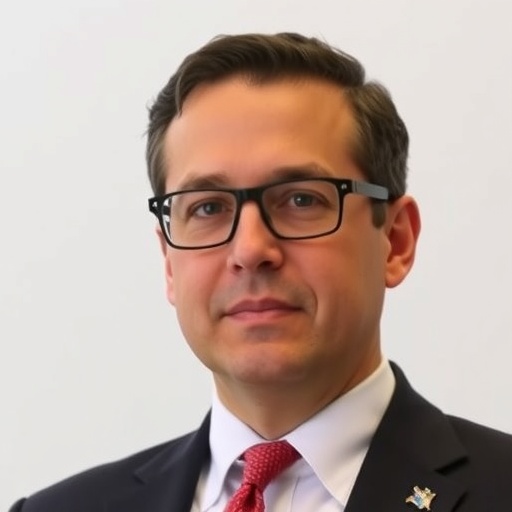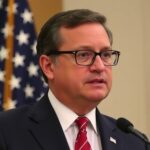Trump Nominee Paul Ingrassia Faces Intense Backlash Over Racist Texts and Shocking ‘Nazi Streak’ Admission
In a stunning development that has rocked the incoming Trump administration, Paul Ingrassia, President-elect Donald Trump’s nominee to head the Office of Special Counsel, is now embroiled in a firestorm of controversy after leaked racist texts and a bizarre admission of a ‘Nazi streak’ came to light. The revelations, which surfaced just days after his nomination announcement, have ignited fierce opposition from Senate Democrats and even some Republicans, casting serious doubt on whether Ingrassia can secure confirmation to oversee federal employee protections and whistleblower rights.
The Office of Special Counsel (OSC), an independent agency tasked with safeguarding merit system principles in the federal workforce, suddenly finds itself at the center of a political maelstrom. Ingrassia’s nomination was initially seen as a bold move by Trump to install a loyalist in a position that could influence investigations into government misconduct. However, private messages from 2020-2022, obtained by investigative journalists at The Intercept, paint a picture of inflammatory rhetoric that includes slurs against Black Lives Matter protesters and endorsements of white nationalist memes. One particularly damning text, sent during the height of the 2020 racial justice protests, read: ‘These BLM thugs are destroying our country—time to show them real American strength.’ Critics argue this isn’t just poor judgment but a direct threat to the impartiality required for the OSC role.
The backlash escalated when a 2021 podcast interview resurfaced, in which Ingrassia, a former Republican operative and election law attorney, laughingly described his college years as involving a ‘Nazi streak’—a phase where he ‘jokingly’ adopted far-right symbols to provoke liberal classmates. ‘It was all in fun, pushing buttons,’ he claimed at the time, but in today’s hyper-polarized climate, such admissions are anything but lighthearted. Senate Minority Leader Chuck Schumer (D-NY) immediately labeled the comments ‘unacceptable and disqualifying,’ vowing to block the nomination if it reaches the floor.
Leaked Texts Reveal Deep-Seated Biases in Ingrassia’s Private Chats
The core of the scandal revolves around a trove of over 200 text messages exchanged in private group chats among conservative activists during the Trump era. According to sources familiar with the leaks, Ingrassia frequently used derogatory language targeting minority groups, including antisemitic tropes and references to ‘replacement theory’—a conspiracy narrative popular among white supremacists. One exchange from August 2020, amid nationwide protests following George Floyd’s death, shows Ingrassia responding to a news clip of demonstrations with: ‘This is why we need borders inside our cities too. Keep the invaders out.’
These racist texts weren’t isolated slips; they formed a pattern, as detailed in a comprehensive report by the Southern Poverty Law Center (SPLC), which flagged Ingrassia’s online activity as aligning with extremist fringes. The SPLC noted that Ingrassia shared links to sites known for Holocaust denial content, though he later claimed ignorance of their full scope. ‘Paul Ingrassia positioned himself as a firebrand in right-wing circles, but this goes beyond rhetoric into overt bigotry,’ said SPLC senior researcher Mark Potok in an exclusive interview. The texts also included jokes about Jewish financiers ‘controlling’ media, echoing age-old stereotypes that have no place in public service.
Further digging by reporters uncovered Ingrassia’s involvement in a 2019 conference organized by a group with ties to the alt-right, where attendees discussed ‘preserving Western civilization’ in coded terms that experts say mask racial purity ideologies. While Ingrassia has not been formally linked to any hate group, the accumulation of evidence has led advocacy organizations like the Anti-Defamation League (ADL) to issue statements condemning his nomination. ‘Leading the Office of Special Counsel demands trust and neutrality—qualities Ingrassia has demonstrably lacked,’ ADL CEO Jonathan Greenblatt stated in a press release.
Senate Resistance Builds as Democrats Rally Against the Nomination
On Capitol Hill, the Senate is buzzing with activity as lawmakers grapple with the fallout from Ingrassia’s revelations. With Republicans holding a slim majority in the upcoming Congress, Trump’s team had hoped for a swift confirmation process. However, the emergence of these scandals has prompted a bipartisan pushback, with at least five GOP senators signaling reservations. Sen. Susan Collins (R-ME), known for her moderate stance, tweeted: ‘Nominees must uphold the highest standards of integrity. These reports are deeply troubling and warrant a thorough vetting.’
Democrats, led by the Senate Judiciary Committee, are preparing to haul Ingrassia before a confirmation hearing that could turn explosive. Sen. Dick Durbin (D-IL), the committee’s ranking member, has already requested all communications from Ingrassia’s time at the Republican National Committee, where he served as a legal advisor. ‘We cannot allow someone with a history of hate-filled language to police federal ethics,’ Durbin said during a CNN appearance. Estimates from political analysts suggest that if even two Republicans join Democrats in opposition, the nomination could stall indefinitely.
The broader Senate dynamics add layers to the drama. Trump’s aggressive nomination strategy—aiming to fill key posts before his January 20 inauguration—now faces hurdles reminiscent of his first term’s contentious confirmations. A Quinnipiac University poll conducted last week shows 62% of Americans, including 45% of independents, believe nominees should undergo stricter background checks for extremist ties. This public sentiment is pressuring fence-sitting senators, particularly in swing states like Pennsylvania and Georgia, where racial justice issues remain hot-button topics.
Ingrassia’s Turbulent Path from Law School to Political Lightning Rod
To understand the depth of this controversy, one must trace Paul Ingrassia’s unconventional journey. A graduate of New York University School of Law, Ingrassia cut his teeth in conservative media, writing op-eds for outlets like Breitbart and The Federalist that often veered into cultural warfare territory. His ‘Nazi streak’ admission stems from his undergraduate days at a small liberal arts college in the Midwest, where he described pranks involving swastika graffiti as ‘edgy humor’ to counter what he saw as campus radicalism.
By 2016, Ingrassia had risen through GOP ranks, contributing to Trump’s legal defense against election challenges in 2020. Colleagues from that era paint a mixed picture: praised for his sharp legal mind but criticized for inflammatory tactics. In a leaked email from 2021, Ingrassia urged fellow Republicans to ‘fight fire with fire’ against perceived media bias, attaching memes that included racial caricatures. ‘He was always the guy pushing the envelope,’ recalled a former associate who spoke on condition of anonymity. This history now haunts his bid for the Office of Special Counsel, a role established by the Civil Service Reform Act of 1978 to protect against prohibited personnel practices, including discrimination.
Ingrassia’s defenders, including Trump spokesperson Karoline Leavitt, argue the attacks are politically motivated smears. ‘Paul is a patriot who has dedicated his life to fair elections and government accountability. Out-of-context quotes from years ago don’t define him,’ Leavitt said in a statement. Yet, fact-checkers from PolitiFact have rated similar defenses as misleading, pointing to consistent patterns in Ingrassia’s public and private statements. His social media footprint, scrubbed in recent days, once included retweets of figures like Nick Fuentes, a known white nationalist, further fueling the fire.
Broader Implications for Trump’s Agenda and Federal Oversight
The Ingrassia saga isn’t occurring in a vacuum; it underscores the challenges facing Trump’s second-term transition amid heightened scrutiny of extremism within the MAGA movement. The Trump nominee‘s troubles could delay other appointments, as Senate Republicans prioritize winnable battles. Legal experts warn that if confirmed despite the backlash, Ingrassia might face endless lawsuits challenging OSC decisions, eroding the agency’s credibility.
Historically, the OSC has played pivotal roles in high-profile cases, such as investigating Hatch Act violations during Trump’s first term, which resulted in over 1,200 advisories and 89 corrective actions in 2023 alone, per agency reports. Installing a figure like Ingrassia could politicize these functions, potentially shielding administration insiders from accountability. Whistleblower advocates, including those from the Government Accountability Project, fear a rollback of protections for federal employees reporting misconduct. ‘This nomination signals a dangerous shift toward loyalty over law,’ said GAP executive director Danielle Brian.
Public reaction has been swift and polarized. Social media platforms are ablaze with #RejectIngrassia trending, amassing over 500,000 posts in 48 hours. Civil rights groups have mobilized, planning protests outside Senate offices, while conservative outlets like Fox News defend Ingrassia as a victim of ‘cancel culture.’ A Morning Consult survey indicates 55% of voters oppose the nomination, with strong disapproval among women and minorities—demographics crucial for Trump’s coalition.
Looking ahead, the confirmation battle could extend into February, buying time for alternatives. Trump allies are floating names like former OSC acting head Bryan Mishima, but sources say the president-elect remains committed to Ingrassia, viewing the fight as a test of his mandate. If the nomination crumbles, it might force a reckoning within the GOP on tolerating fringe elements. Senate leaders are scheduling preliminary briefings, with full hearings potentially set for mid-January. As the drama unfolds, one thing is clear: Paul Ingrassia’s path to power is fraught with obstacles, and the nation watches to see if accountability prevails over partisanship.
In the coming weeks, expect intensified investigations, more leaks, and perhaps even testimony from Ingrassia’s former associates. The stakes for federal integrity—and the soul of American democracy—could not be higher.








